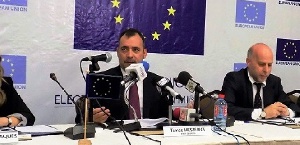The European Union Election Observation Mission (EU EOM) says Ghana’s closely contested Presidential and Parliamentary elections delivered to the Ghanaian people a generally well-administered and transparent vote, which largely escaped the violence many had feared.
However, the EU EOM added the misuse of incumbency, including unequal access to state media, and unaccountable campaign financing were areas Ghana could address in the future.
The Chief Observer Tamás Meszerics, who is a Member of the European Parliament, said: “In the evolution of its democracy since 1992, Ghana has passed the benchmark for credible, inclusive and transparent elections. From now it can focus on those areas which continue to give rise for concern.”
Mr Meszerics pointed notably to the misuse of the resources and infrastructure of incumbency, to a need for state media to provide fair and balanced coverage for all election contestants, and to the need to increase confidence in institutions so as to reduce tension around elections.
The EU EOM deployed 24 long-term observers to all ten regions of Ghana on 6 November. Their activities were complemented by 32 short-term observers deployed on 4 December. They were joined by 16 observers from EU and EU-partner embassies in Ghana and a delegation of six Members of the European Parliament.
The head of the MEP delegation, Mr Eduard Kukan, said: "The day after the results are announced, everyone has to play their respective roles, both government and opposition, in a constructive way for the benefit of all Ghanaians and the future prosperity of the country.”
The EU EOM observation follows the entire electoral process in Ghana before, during and after voting, including any legal disputes that may subsequently arise. A Final Report will be presented some two months after the announcement of results.
Mr Kukan added: “We believe that future would be better served by greater participation of women in the highest levels of Ghana’s political life. From a big field of presidential and parliamentary candidates, we saw too few women, which is a symptom of cultural and systemic impediment and exclusion.”
The EU EOM observation follows the entire electoral process in Ghana before, during and after voting, including any legal disputes that may subsequently arise. A Final Report will be presented some two months after the announcement of results.
Source : EU Mission
General News of Saturday, 10 December 2016
Source: accrafm.com













